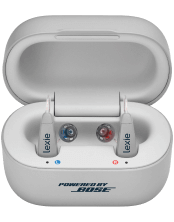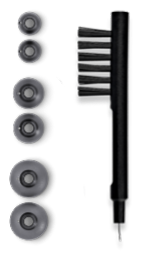Dementia and Hearing Loss in Adults
Published: September 12, 2023
Updated: September 14, 2023
What is dementia?
Dementia and hearing loss are closely linked. Dementia is an umbrella term for loss of memory, language, problem-solving, and other thinking abilities that are severe enough to interfere with daily life. Alzheimer’s disease is the most common form of dementia and may contribute to 60–70% of cases.
While dementia mainly affects older people, this type of serious mental decline is not a normal part of aging. There is no single test to determine if someone has dementia. Doctors diagnose Alzheimer’s disease and other types of dementia based on a careful medical history, a physical examination, laboratory tests, and the characteristic changes in thinking, day-to-day function, and behavior.
What causes dementia?
Dementia is caused by damage to brain cells. This damage interferes with the ability of brain cells to communicate with each other normally, which can affect thinking, behavior, and emotions. The brain has many distinct areas, each of which is responsible for different functions (for example, memory, judgment, and movement). When cells in a certain area are damaged, that area cannot carry out its specific functions normally. Researchers believe that the different types of dementia result from a combination of factors, with most of them being genetic.
How does dementia affect someone?
Dementia affects each person differently. The illness can be described in 3 stages. The onset of dementia is gradual and because of this symptoms of the early stage are often overlooked but may include forgetfulness, losing track of the time, and becoming lost in familiar places. As dementia progresses to the middle stage, the signs and symptoms become obvious and concerning. These include becoming lost at home, forgetting events and people’s names, struggling with communication, needing help with personal care, and experiencing behavior changes such as wandering and repeating questions.
In the late stage of dementia, symptoms are severe, and individuals become almost totally dependent on others for care. The person may be unaware of the time and place, become aggressive, have difficulty recognizing relatives and friends, and have difficulty walking. Dementia can be overwhelming for the families of affected people and their carers. Physical, emotional, and financial pressures can cause great stress and difficulty.
How can dementia be treated or prevented?
While there is no proven treatment available to cure dementia, much can be done to support and improve the lives of people with dementia, as well as their carers and families. Early diagnosis and identification of symptoms is important and allows time for positive lifestyle changes and planning for future needs. While genetic factors play an important role in whether or not you may develop dementia, other risk factors have to do with the environment and lifestyle.
Individuals who experience depression and social isolation, and who do not engage in mentally stimulating activities, have a greater chance of developing dementia. Studies also show that people can reduce their risk of dementia by getting regular exercise, not smoking, avoiding the harmful use of alcohol, controlling their weight, eating a healthy diet, and maintaining healthy blood pressure, cholesterol, and blood sugar levels.

Is there a link between dementia and hearing loss?
Dementia and hearing loss have one thing in common: they both more frequently affect older people than younger people. Of those suffering from dementia worldwide, 90% are over the age of 65. About 30 percent of adults over age 65 years and 55 percent over age 80 years show some degree of hearing loss. Age-related hearing loss and dementia both have a great impact on a person’s social functioning, independence, and quality of life.
Common symptoms of both dementia and hearing loss overlap, including confusion during a conversation, changes in methods of communicating, difficulty completing everyday tasks, and feelings of fatigue or stress. As a result, hearing loss can even be misdiagnosed as dementia or make the symptoms of dementia appear worse.
Considering the above, much research has been done to see if there is a relationship between hearing loss and dementia. For example, in one study, people with hearing loss were 24% more likely to have Alzheimer’s disease. In another, it was found that the worse the hearing loss was, the more likely the person was to develop dementia. When considering 9 potential environmental risk factors for dementia, hearing loss was rated the highest.
While these studies don’t suggest that hearing loss itself causes dementia, they do show that there is a link between the two. Researchers have given some possible explanations for this link:
- Change in brain function: When hearing loss is present, a particular part of your brain in charge of hearing and processing auditory information grows inactive or starts to work differently. This causes changes in how the brain is structured and organized and could be related to the effects of dementia.
- Brain Overload: When you can’t hear well, it takes a lot more effort to make sense of what people are saying. The brain needs to use more resources to process auditory information, and conversations require more mental energy and work. If your everyday conversations are taking up most of the mental energy you have, there is less available to use for other functions such as learning, memory, and problem-solving. This can further set the stage for Alzheimer’s disease and other forms of dementia.
- Social isolation: Both hearing loss and dementia contribute to social isolation. You may not want to be with people as much, and when you are, you may not engage in conversation as freely. People with untreated hearing loss are more likely to experience loneliness, depression, and anxiety, and are less likely to join in social activities. The less we stimulate our brains by interacting with other people, places, and things — and the less we use our brains to hear and listen — the more quickly our brains decline, putting us at greater risk for dementia.
Can hearing aids help to prevent dementia?
Dementia is a complex illness and there are no simple answers as to how it can be prevented. The early identification and treatment of potential hearing loss can help to minimize the risks of impaired functioning later in life. OTC hearing aids do much more than improve a person’s hearing—they also help preserve a person’s independence, mental abilities, emotional and physical health, and work, home, and social lives. A meaningful and fulfilling life keeps your brain active and can help to reduce your risk of developing dementia.
Today’s hearing aid technology allows for easier speech understanding in the presence of background noise, due to improved signal processing. This helps to reduce listening effort and brain overload associated with not hearing well. Your brain is freed up for other functions requiring mental energy. Treating a hearing problem and wearing a hearing aid if you need one will contribute to maintaining a healthy level of hearing fitness. This, in turn, will contribute to your overall mental fitness and wellbeing.






